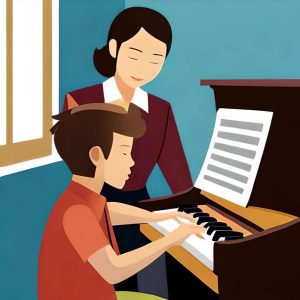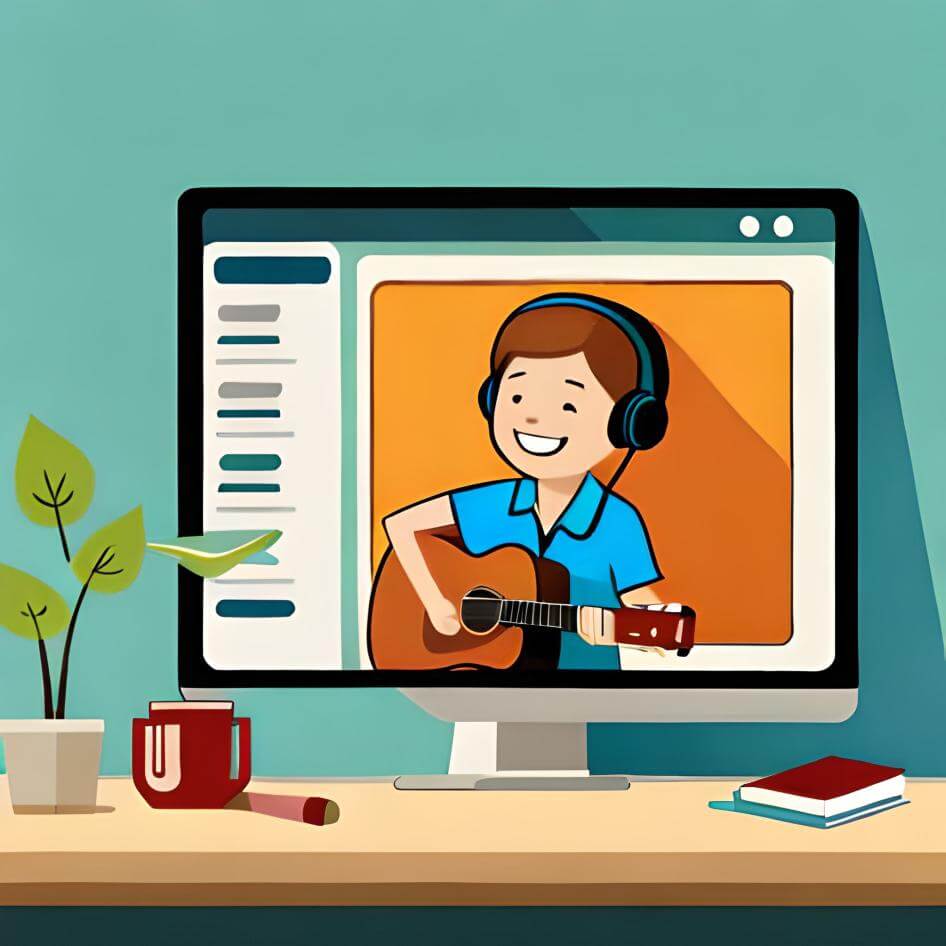
For passionate musicians who desire to share their knowledge and inspire others, embarking on a career as an independent private music teacher can be fulfilling and rewarding. While it may seem daunting, knowing that anything worth pursuing has its challenges can be encouraging. This article aims to provide guidance and insights into starting a successful career as an independent private music teacher. From setting up your studio and establishing a teaching philosophy to marketing strategies, we will explore the key steps to help you create a thriving and sustainable music teaching studio.
Define Your Teaching Philosophy and Goals
Before diving into your career as an independent private music teacher, take the time to define your teaching philosophy and goals. Consider the musical genres, instruments, or techniques you specialize in, and identify your unique teaching approach. Reflect on your values, teaching style, and the type of students you wish to attract. This clarity will serve as a foundation for developing your curriculum, teaching materials, and marketing strategies.
Define your music teaching philosophy: Defining your music teaching philosophy is essential in developing a clear and coherent approach to imparting musical knowledge and skills. It involves reflecting on your beliefs, values, and goals as an educator and understanding how they shape your teaching methods and student interactions. Your music teaching philosophy is a guiding framework that influences your instructional strategies, classroom management, and overall approach to fostering a positive and enriching learning environment. Articulating your music teaching philosophy helps you communicate your educational values to students, parents, and colleagues and serves as a foundation for continued professional growth and development as a music educator.
Define your music teaching goals: Defining your music teaching goals is crucial for setting a clear direction and purpose in your role as a private music teacher. These goals serve as a roadmap for planning and implementing effective music instruction. They can encompass various aspects, including student achievement, skill development, artistic expression, and personal growth. Music teaching goals include:
- Fostering a love and appreciation for music in students.
- Nurturing their technical proficiency on instruments.
- Promoting ensemble collaboration.
- Encouraging creativity and improvisation.
- Enhancing music literacy.
- Instilling a lifelong passion for learning and exploration.
By establishing specific and measurable goals, you can create meaningful learning experiences and track progress, ensuring that your teaching remains focused, impactful, and tailored to meet the unique needs and aspirations of your students.
Define what you’ll teach: What instruments or lesson types do you plan to offer? As you think about this, consider both what you’re skilled at and what types of lessons most people are searching for. The piano is the most common type of private music lesson people search for. However, it’s also the most competitive. Don’t let that scare you. Surprisingly, there is a shortage of private piano teachers in most areas. Many parents and students cannot find a piano teacher and give up on finding one. If you teach piano and follow the tips in our guide to market your music lesson business, you’ll get piano students if that is what you teach. Suppose you teach an uncommon instrument. In that case, you might want to supplement other lesson types to ensure you get enough students for your music lesson business.
Define who you’ll teach: What age groups do you plan to focus on? What experience levels do you want to attract? Do you plan to teach in a studio, at people’s homes, or online? These are all questions you’ll want to answer early. There are trade-offs with everything. For example, if you teach at people’s homes you won’t need a studio, but you will need a car and extra time to travel between students’ homes. You’ll want to price your services accordingly. If you’re too cheap, you’ll get burned out and lose money. We can’t cover everything you’ll need to consider during this step, but we do want to convey that you’ll need to visualize how you’ll provide the lessons you offer.
Define your unique selling proposition (USP): What differentiates you from other music teachers in the area you plan to teach? You might notice a big school or experienced music teacher nearby and think, ‘I can’t compete.’ Don’t be deterred. You can specialize in something they aren’t. You can be more convenient. If you’re new, you likely have more availability. Don’t let the competition discourage you. Competition means there is demand for music lessons in your area, and it’s likely a lot more demand than you think.

Do you want to get more students and grow your music teaching business?
MusicTeacherNotes is music teacher software that helps music teachers get more students and manage all aspects of their music teaching business! Every teacher who registers for a free account gets a Music Teacher Directory listing, even if they never upgrade. There is no risk in joining.
Set Up Your Teaching Space
Creating a conducive learning environment is vital for private music teachers. Designate a dedicated space in your home, or consider renting a studio where you can conduct lessons comfortably. Ensure the space is well-equipped with the necessary instruments, accessories, and teaching materials. Set up a professional-looking and inviting area that inspires creativity and engagement.
In-person lessons at your studio: If you open a studio, consider how many students you’ll need to cover your overhead. You’ll likely need 15-25 weekly students to cover the cost of renting a music studio. Therefore, beginning music teachers may want to travel to students’ homes or provide online music lessons until a large student base emerges. If you’re fortunate enough to provide lessons out of your own home, you can save a lot of money and possibly even write off part of the cost of your home from your taxes.
In-person lessons at students’ homes: Providing music lessons a students’ homes is a good way to market yourself as a music teacher. More established music schools are unlikely to provide at-home lessons, giving you a big competitive advantage. The trade-off is time and money spent going from one student’s house to another. You’ll probably want to invest in a fuel-efficient car, possibly an EV, to cut costs. Additionally, you’ll likely want to charge a premium for the cost of providing music lessons at people’s houses. Consider batching your at-home students by days and locations. For example, if you have a few students who live close to each other, schedule their music lessons on the same day so you only have to drive a short distance to get to the next student. Batching at-home music lessons by location helps you get more music students by targeting underserved neighborhoods away from where you live.
Online music lessons: Online music lessons are another excellent option for new music teachers to get students. One significant benefit is that teachers can expand their reach to other locations and time zones. Most music students are children, and after school is a coveted time. This means you might need help filling time before schools let out. You can fill these times by providing online music lessons to students in time zones to the East of where you live because their time is ahead of yours.
Determine Your Pricing and Policies
Establishing clear pricing and policies is essential for running a successful independent teaching practice. Research the market rates in your area and consider factors such as your qualifications, experience, and demand. Decide on your lesson duration, payment structure (per lesson or monthly), and cancellation policy. Transparently communicate these details to potential students, to help students and parents understand your expectations from the outset. Here are a few tips you should follow when determining your music lesson pricing and policies.
Don’t undervalue your services: Avoid undervaluing your services by pricing them too low. While it may seem tempting to compete on price, it can lead to burnout and a loss of enjoyment in teaching music. Instead, consider pricing on the higher end and focus on providing exceptional value to your students. By delivering additional benefits and a high-quality experience, you can retain students and cultivate a thriving teaching practice.
Have a clear cancellation policy: A clear cancellation policy is essential for maintaining professionalism and managing expectations in your music teaching practice. Clearly outlining your policy helps ensure that you and your students are on the same page regarding cancellations, rescheduling, and associated fees. A well-defined cancellation policy sets boundaries, establishes a respectful approach to scheduling changes, and helps you maintain a consistent teaching schedule while providing flexibility when necessary.
Define how and when payment should occur: Defining upfront how and when payment should occur is crucial for a smooth and transparent relationship with your students. By clearly communicating your payment expectations, you establish trust and avoid misunderstandings. It sets a professional tone and ensures both parties know their payment responsibilities. Clearly defining payment methods, due dates, and any late fees or discounts helps create a mutually beneficial arrangement and contributes to your music teaching business’s overall success and sustainability.
To assist you in addressing pricing considerations comprehensively, we have compiled a list of additional factors to consider when determining how to charge for the music lessons you provide. By reviewing these considerations upfront, you can ensure you have thought through the various aspects of setting your pricing structure effectively.
Lesson Duration: Determine the length of each lesson based on the age and skill level of your students. Standard options include 30 minutes, 45 minutes, or 1 hour. If you teach in people’s homes, you must allot time to leave one student and travel to the next student. While 30-minute lessons are common, they can lead to issues where one student is late, causing a domino effect for other students. Additionally, it can feel rushed when transitioning between students.
Payment Options: Decide the payment methods you will accept, such as cash, checks, or online payments. Consider using platforms like PayPal or Venmo for convenience. You’ll want to avoid payment hassles. It is better to have one or two payment methods for all of your students than having some pay in cash, some with a check, some via PayPal, and others with a credit card. Doing so can become a bookkeeping nightmare.
Lesson Packages: Offer different package options, such as a set number of lessons paid in advance, to incentivize commitment and save student costs. To get new students, consider offering a lesson or two for free.
Scheduling Flexibility: Consider your availability and determine if you will offer flexible scheduling options or have set lesson slots. Decide how far in advance students can schedule or reschedule lessons.
Studio Policies: Establish guidelines on attendance, tardiness, and make-up lessons. Clearly communicate your expectations to ensure a smooth and consistent learning experience.
Student Assessment: Determine how you will assess student progress, whether through periodic evaluations, recitals, or other performance opportunities.
Refund Policy: Outline your policy for refunding prepaid lessons in case of student withdrawal or unforeseen circumstances.
Communication Channels: Decide on the preferred method of communication with students and parents, such as email, phone calls, or a dedicated online platform. Using MusicTeacherNotes as your music teaching platform, you can easily communicate with all your students, as needed.
Considering these additional factors, you can ensure that your pricing and policies section comprehensively addresses the various aspects necessary for a successful and well-structured private music teaching business.
Market Your Music Lesson Business
Marketing your new music lesson business is a never-ending process that requires a lot of thought and persistence to get it right. We recommend reading our Music Teacher Marketing Guide to grasp what is involved fully. We also encourage you to read other marketing material from sites like Hubspot. We’ll explain some key concepts you should consider when developing your marketing strategy for the types of music lessons you plan to offer.
Create a Website: Create a professional website that showcases your qualifications, teaching philosophy, and testimonials. A music teacher’s website doesn’t need to be complicated, but it does need to be well-designed and designed to attract students.
Utilize Social Media Platforms: You can perform social media marketing for music lessons simply by sharing content, such as practice tips, performance videos, and student success stories.
Leverage Online Music Teacher Directories: MusicTeacherNotes allows you to create a free Music Teacher Directory listing when registering an account. But don’t just use ours. Add yourself to every directory you can, especially free ones.
Offer free lessons: Consider offering trial lessons to entice new students. A new student might pay you over $1000 per year in revenue. Don’t hesitate to offer a few free lessons to new students because it helps you recruit them for the long term.
Define Your Target Market: Identify the ideal demographic for your music lessons (e.g., age group, skill level, musical genre preference). Consider the local community, schools, and music organizations as potential sources for your target market. Analyze your competition and understand what makes you unique.
Craft Your Brand Identity: Develop a unique brand name that reflects your teaching style and values. Create a compelling logo and visual identity to enhance brand recognition. Write a clear and concise mission statement communicating your teaching approach and the benefits students can expect.
Utilize search engine optimization (SEO): Using SEO for music lessons means using techniques that help search engines rank you higher when a potential student types a query about the music lessons you offer.
Leverage Online Advertising: Use paid advertising platforms such as Google Ads and social media ads to target your desired audience. Design compelling ad copy highlighting your unique selling points and encouraging potential students to inquire about or book lessons.
Use Print Advertising: Marketing methods like Direct Mail and Door-Hanging Flyers aren’t dead, and in fact, they work extremely well for music teachers who teach in a studio or at people’s homes.
Get Reviews and Testimonials: Encourage satisfied students to provide testimonials and online reviews to build credibility. Every new student wants to read reviews and testimonials before contacting a music teacher. MusicTeacherNotes has a feature called the Testimonial Autopilot, which automates the process of getting testimonials and eliminates the headache of you having to ask and remind your students to provide them.
Encourage Word-of-Mouth Marketing: Word-of-mouth referrals can be invaluable, so cultivate positive relationships with students and their parents. Go over and above as a teacher, and students and parent will naturally share their experience with others.
Network: Collaborate with local music stores, schools, and organizations to expand your network and reach.
Monitor and Evaluate: Regularly track the effectiveness of your marketing efforts using analytics tools. Analyze website traffic, conversion rates, and student acquisition channels to identify areas for improvement. Adjust your marketing strategies based on the insights gained from your analysis.
This article covers many things you’ll want to consider when starting a new music lesson business, but it’s far from complete. To learn more, we highly recommend reading our article called, 16 Music School Marketing Strategies to Get New Students. That article does a deep dive into the world of music teacher marketing and links to other articles about specific marketing topics.

 Do you want to get more students and grow your music teaching business?
Do you want to get more students and grow your music teaching business?